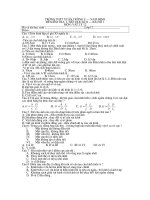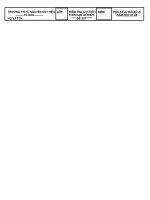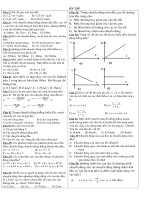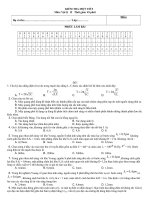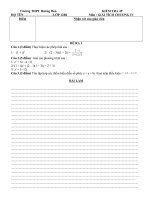kiem tra 1 tiet 12 lan 2
Bạn đang xem bản rút gọn của tài liệu. Xem và tải ngay bản đầy đủ của tài liệu tại đây (88.61 KB, 2 trang )
<span class='text_page_counter'>(1)</span>ENGLISH PAPER-TEST FOR GRADE 12.- No2 Full name:___________________________. Class:_____ Choose the best option by circling the corresponding letter A, B, C or D that can suit the following question(from 1 to 22): 1. My bike_______ last night. A. was stealing B. stole C. stolen D. was stolen 2. If I ______my passport, I’ll be in trouble. A. would lose B. lost C. lose D. will lose 3. She gives children everything _____ they want. A. what B. that C. whom D. whose 4. ______ should try to make good impression on interviewers. A. Applicants B. Applied C. Applying D. Apply 5. We __________Dorothy since last Saturday. A. hadn’t seen B. haven’t seen C. don’t see D. didn’t see 6. I don’t like ________ personal questions. A. being asked B. asking C. being asking D. to ask 7. Have you finished __________ the essay that I asked you to? A. to write B. write C. writing D. written 8. Remember _________ the door before going to school. A. lock B. locking C. locked D. to lock 9. If you ________ your passport, you’ll be in trouble. A. would lose B. will lose C. lose D. lost 10. Do you know the girl ________ father is our teacher? A. whose B. who C. whom D. which 11. After I graduate from this University, I’ll apply _______ a job in his company. A. to B. for C. with D. on 12. We were very tired after a hard work yesterday, so we stopped _______ a rest. A. taking B. take C. took D. to take 13. I will be away tomorrow. Can you look ________ my children? A. at B. for C. after D. up 14. This is the park ______ we first met. Do you remember? A. which B. where C. that D. in that 15. He is not _______ to join the army. A. old enough B. enough old C. age enough D. enough age 16. There are many differences _______ Vietnamese culture and American culture. A. in B. among C. of D. between 17. If he passes the final exam, his father _______ him a new bike. A. will buy B. buys C. would buy D. bought 18. She is ______nervous that she can’t say anything, but keep silent. A. so B. such C. too D. very 19. His father takes _______for supporting the whole family. A. responsible B. possibility C. responsibility D. ability 20. Nam performed _______ at the singing contest last night. A. perfect B. perfectly C. accuracy D. good 21. Hung: “We’re going on a trip to Da lat next week.” Tuan: “__________.” A. It’s kind of you to say so B. Yes, please C. Have a good time D. Sorry, I can’t 22. “If I were you, I would do morning exercise regularly,” said John. A. John prevented me from doing morning exercise regularly. B. John asked me to do morning exercise regularly. C. John advised me to do morning exercise regularly. D. John congratulated me on doing morning exercise. Find out an error in each following sentence that needs correcting by circling the corresponding letter A, B, C or D(from question 23 to 25): 23. I would like apply for the position of tour guide in my father’s friend’s company. A B C D 24. Don’t forget to say goodbye to the interviewer before leave the office. A B C D.
<span class='text_page_counter'>(2)</span> 25. Nowadays, many job opportunities are finding in big cities. A B C D Choose the word whose underlined part is pronounced differently from the rest in the same line(from 26 to 28): 26. A. apply B. carefully C. entry D. discovery 27. A. character B. teacher C. chemist D. technical 28. A. course B. four C. our D. yours Choose the word that is stressed differently from the others by circling A, B,C or D(form question 29 to 30: 29. A. common B. exam C. degree D. prepare 30. A. stressful B. pressure C. prepare D. future Fill in each numbered blank with one suitable word or phrase(from question 31to 35): What do you do well? What do you enjoy doing? Your answers to these two questions will help you identify your (31) _____. An employer will consider you seriously for a position when you can show them that you know who you are, what you can offer and which you have studied. Sometimes it is difficult to know what your weaknesses are. Clearly not everyone is equally good (32) _____ everything. You may need to improve yourself and so taking courses in that field could turn a weakness into strength. You will need to (33) _____ some time on your self-assessment. Your honesty and the desire for selfimprovement will lead to success in getting the right job. Explore the following seven areas to start to get to know yourself: your aptitude, your skills, your personality, the level of responsibility you feel comfortable with, your interests and your needs. Ask yourself if you have any special talents and if you need to consider your physical health when choosing a job. Be as honest and realistic as you can, and ask for other people's (34) _____ if necessary. Make a list of these things. It is usually a good idea to talk about your aptitudes with teachers, family and friends; If you are considering a career that requires a special talent, such as art, acrobatics, mathematics or music, discuss your aptitudes with (35) _____ expert in that area and discover how they fit the needs of the occupation. 31. A. strong B. strength C. strengthen D. strengthened 32. A. upon B. in C. at D. for 33. A. use B. make C. lose D. spend 34. A. interests B. fields C. opinions D. attendances 35. A. a B. an C. the D. no article Choose the item (A, B, C or D) that best completes each of the following sentences( from question 36 to 40): In 1988, for the first time in British history, a National Curriculum was introduced. The National Curriculum tells pupils which subjects they have to study, what they must learn and when they have to take assessment tests. Between the ages of 14 and 16, pupils study for their GCSE (General Certificate of Secondary Education) exams. Pupils must take English Language, Maths and Science for GCSE, as well as a half GCSE in a foreign language and Technology. In addition, they must also be taught Physical Education, Religious Education and Sex Education, although they do not take exams in these subjects. At the age of 16, pupils can leave school. If pupils stay on, they usually take A (Advanced) levels, AS (Advanced Supplementary) level or GNVQs (Greater National Vocational Qualifications). It is quite common to combine, for example, two A levels with one AS level, or one A level with one GNVQ. Pupils taking A levels study traditional subjects, such as French, Physics or History. To go to university, pupils usually need two or three A levels. AS levels are the same standard as A levels, but only half of the content: AS level German pupils take the Alevel German language exam, but do not take the A-level German Literature exam. GNVQs are vocational qualifications. Pupils usually take on GNVQ in subjects such as Business, Leisure and Tourism, Manufacturing, and Art and Design. One GVNQ (at advanced level) is equal to two A levels. 1. Britain began to have a National Curriculum _________. A. one hundred years ago B. in the nineteenth century C. in 1898 D. in 1988 2. Which of the following subjects do British students NOT take exams in? A. Science B. Physical Education C. Maths D. English Language 3. Pupils need _________A levels to continue to study at university. A. one or two B. two or three C. four or five D. five or six 4. Which of the following subjects do pupils NOT have to take on GNVQ? A. German Literature B. Business C. Art and Design D. Manufacturing 5. Pupils normally study for their GCSE between the ages of _________. A. 12 and 14 B. 14 and 16 C. 15 and 17 D. 16 and 18.
<span class='text_page_counter'>(3)</span>
